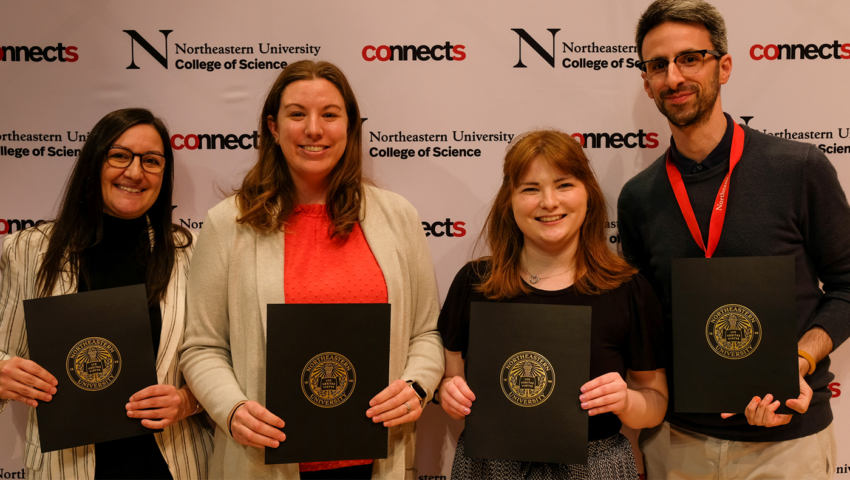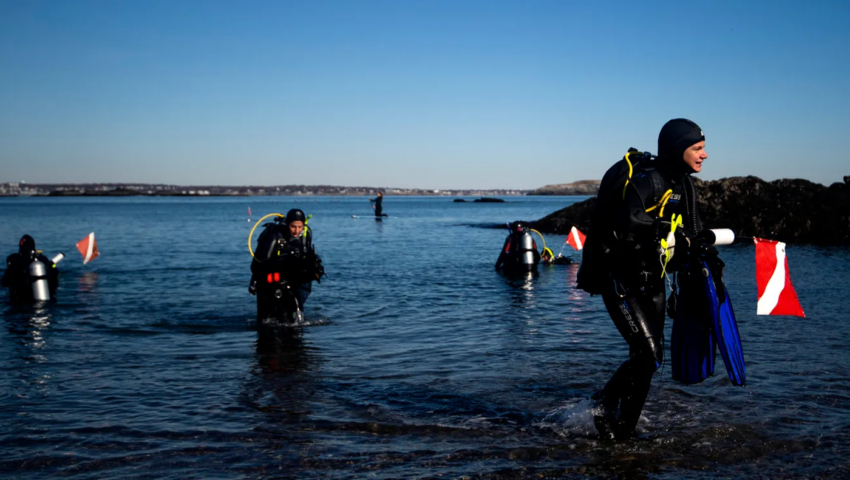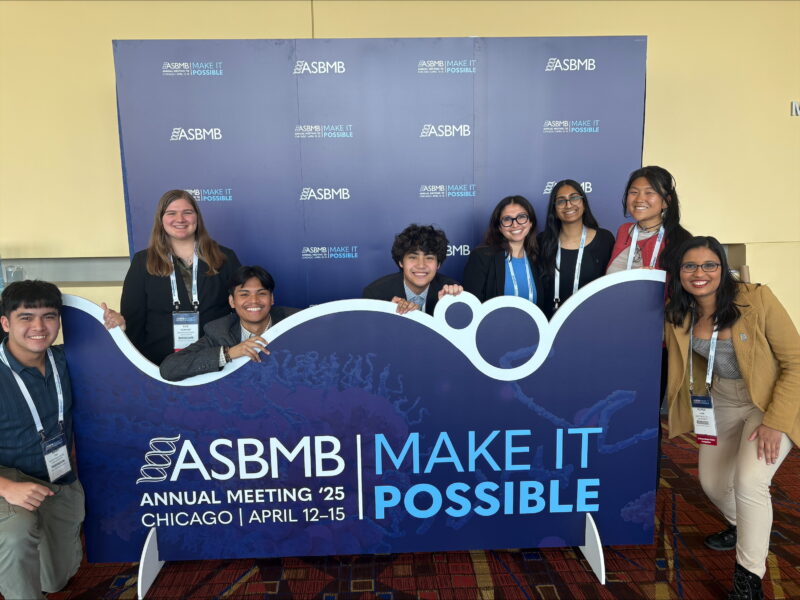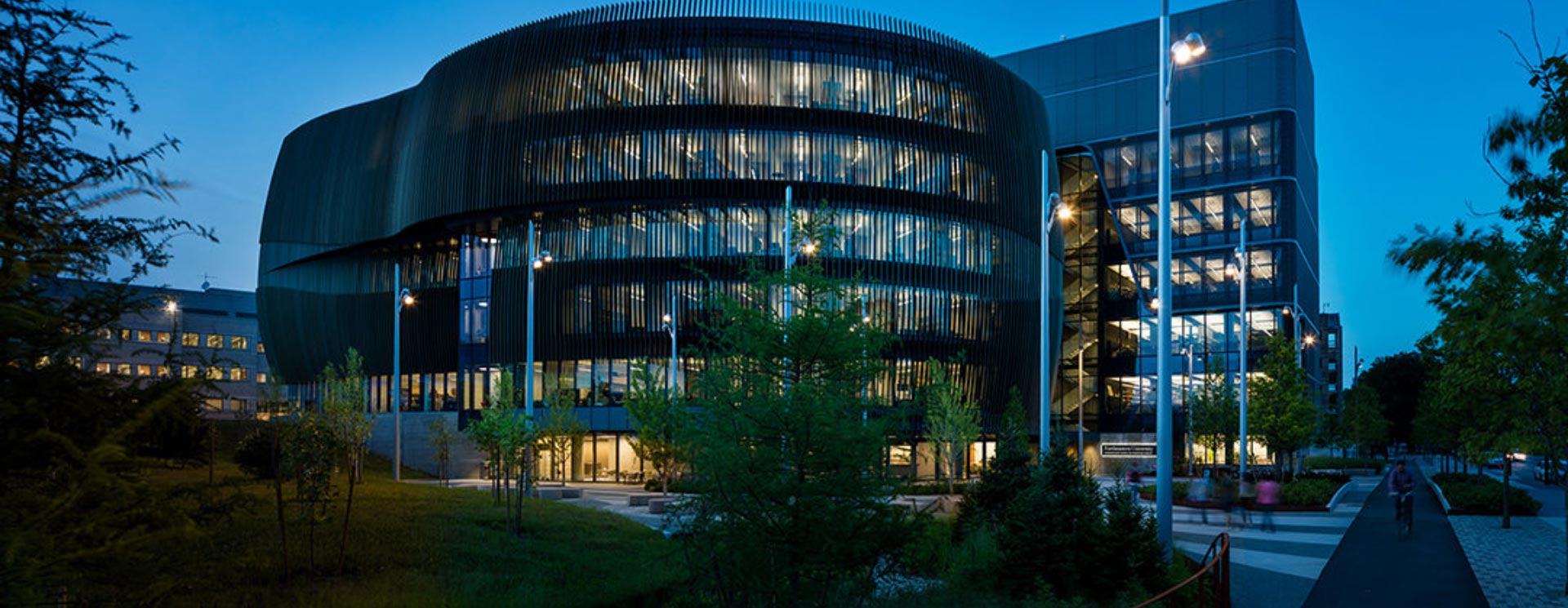
Faculty Labs
News
Congratulations to the 2025 College of Science Award Winners!
We’re extraordinarily proud to recognize the following College of Science faculty and staff for their outstanding contributions and commitment to leadership, mentorship, research, teaching, innovation, and EDIJ initiatives within the College and Northeastern University.
COS Excellence in Teaching Award
Leila Deravi, Associate Professor, Chemistry and Chemical Biology
Benjamin Dittbrenner, Associate Teaching Professor, Marine and Environmental Sciences
Andreia Ionescu, Assistant Professor, Biology
COS Excellence in Research Award
Iva Halacheva, Assistant Professor, Mathematics
Paul Whitford, Professor, Physics
Aron Stubbins, Professor, Marine and Environmental Science and Chemistry and Chemical Biology
COS Excellence in Mentorship Award
Roman Manetsch, Professor, Chemistry and Chemical Biology
Juliet Davidow, Assistant Professor, Psychology
COS Excellence in EDIJ Award
Johan Bonilla Castro, Assistant Professor, Physics
Marya Mahmood, Associate Director, Belonging and Engagement
COS Staff Award for Excellence and Leadership
Stephanie Frazitta, Director, Undergraduate Advising
COS Staff Award for Excellence in Mentorship
Linda Ayrapetov, Director, Student Programs
COS Rising Star Staff Award
Nicki Hosey, Academic Advisor, Undergraduate Advising
COS Innovation Award
Missy McElligott, Teaching Professor, Biology
Hari Kumarakuru, Assistant Teaching Professor, Physics
Tracy Tan, Assistant Dean, Professional Programs
Nicole Viquez and Vincent Capone, Senior Academic Advisors, Undergraduate Advising
Announcing the 2025-2026 Advancing Women in Science Scholars
Congratulations to the newest recipients of the Advancing Women in Science scholarship! These students will take part in a year-long cohort program focused on enhancing their professional development and mentoring abilities, while also building a strong support network to foster their continued growth and success in science. This year, thanks to generous donors, the scholarship was extended to PhD students. Read more about these exceptional scientists below!
Undergraduate Recipients
Amalia Costa, Cell and Molecular Biology
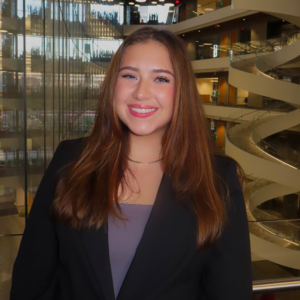
Amalia Costa is a second year cell and molecular biology major with a minor in Ethics. Her hometown is South Kingstown, Rhode Island. On the pre-medical track with an interest in oncology, she is passionate about bridging science and patient care. She is currently on co-op working as a Patient Care Technician. She is a research assistant in the MAdS Lab under Dr. Santos. Her work centers on targeting the BAM complex in Gram-negative bacteria to disrupt their outer membrane formation, with the goal of identifying new treatments for antibiotic-resistant infections. In addition to her studies, she served as a teaching assistant for Foundations of Biology. Outside the lab and hospital, she plays the clarinet in the Northeastern University Symphony Orchestra.
Lauren Kong, Behavioral Neuroscience
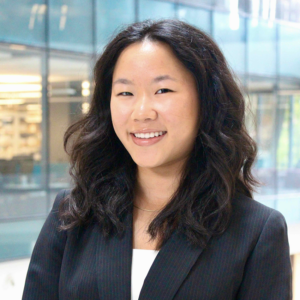
Lauren Kong is driven by a personal mission to bridge science, innovation, and business strategy in ways that meaningfully transform lives. She is passionate about translating novel research into real-world solutions that are both impactful and equitable, especially for the communities that need them most. Guided by purpose, enthusiasm, and curiosity, Lauren actively seeks out opportunities to learn, grow, and lead. She currently conducts research at The Brain Impact Lab, investigating how exercise influences cognition and brain health, and has held multiple executive roles in Northeastern University’s student organizations, including Evolve and the Entrepreneurs Club. With a deep commitment to healthcare entrepreneurship, Lauren is dedicated to advancing data-driven, human-centered innovation that challenges systemic disparities and redefines what personalized and accessible healthcare can look like.
Imani Mbusu, Behavioral Neuroscience
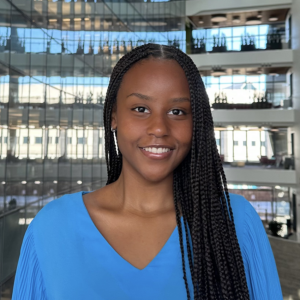
Imani Mbusu is a second-year behavioral neuroscience student from Westampton, New Jersey. She is particularly interested in studying neurodegenerative diseases, and aspires to become a doctor in a neuroscience-related field of medicine. Currently, Imani is on co-op at Harvard Medical School in the Sinclair Lab, where she studies animal behavior in mouse models, explore chemical reprogramming, and perform various wet-lab techniques.
Doga Oge, Behavioral Neuroscience
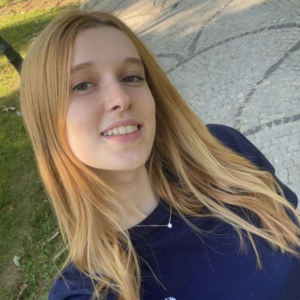
Doga Oge is a second-year behavioral neuroscience major on the pre-med track originally from Istanbul, Turkey. She is passionate about psychiatric neuroscience and using technology to make mental health treatment more accessible. Doga will soon join the Visual Cortex Research Project at McLean Hospital, where she will work with psychiatrists from the Psychotic Disorders Division at Harvard Medical School to study visual perception disturbances, brain structure, and early biomarkers of psychosis. She is currently designing a mental health accessibility app that connects underserved communities with top psychiatrists through group therapy sessions. She dreams of becoming a psychiatrist who also codes her own clinical tools to close gaps in care and reach those who are often overlooked. In her free time, she enjoys playing violin, exploring AI, and mentoring others in STEM.
Naadia Rashid, Cell and Molecular Biology
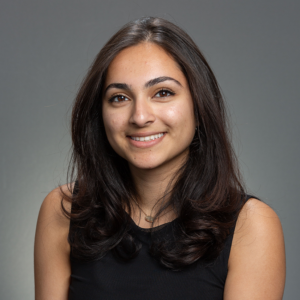
Naadia Rashid is a second-year cell and molecular biology student with a minor in data science from Richmond, Virginia. She is a research assistant in the Apfeld Lab at Northeastern University, where she is studying the interplay between molecular genetics and environmental stressors in the context of aging. Passionate about genomic medicine, she is working on a project investigating how genetic perturbations in the metabolic pathway influence glycogen detoxification. She has also worked on exploring redox properties of small peptides relevant to amyloid-beta and Alzheimer’s disease pathogenesis under Dr. Vaso Lykourinou as a Russell Women in Science Scholar. She hopes to pursue a career in medicine with a focus on clinical genetics.
Meera Shukla, Behavioral Neuroscience
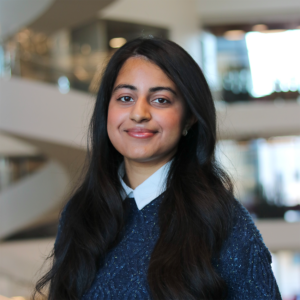
Meera Shukla is a second-year behavioral neuroscience major interested in child and adolescent brain development and its impact on health. She currently works as an undergraduate research assistant at the Social Development and Wellbeing lab, as well as a patient navigator at the South End NeighborHealth Clinic with Link Health. In her free time, Meera enjoys writing, listening to podcasts, as well as cooking and creating new recipes. She hopes to one day intertwine her interest in research and patient care after graduation.
PhD Candidate Recipients
Marcela de Barros, Chemistry and Chemical Biology
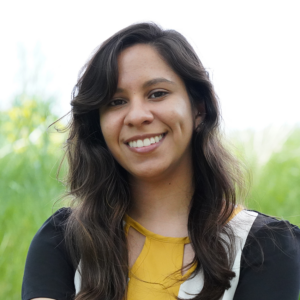
Marcela de Barros is a first-generation chemist from Brazil and a fourth year PhD candidate in chemistry. Her research in the Mattos Lab focuses on understanding disease-related mutations in Ras GTPase proteins, with implications for cancer and developmental disorders. Passionate about fostering inclusion in science, Marcela is actively involved in mentorship and advocacy through organizations such as the Alliance for Diversity in Science and Engineering (ADSE), the Northeastern Section Younger Chemists Committee (NSYCC-ACS), and she is a mentor in the Connected Science Community PhD Mentorship program. She is currently on co-op at Biogen working in the Biotherapeutics Discovery & Delivery group where she is diving into antibody research. In her free time, she enjoys ice skating, solving puzzles, handcrafting, and loves cats and sci-fi!
Angela Jones, Marine and Environmental Sciences
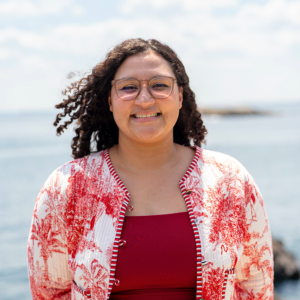
Angela Jones is a fourth year PhD candidate in marine and environmental sciences. She moved to Boston from Arcata, California where she earned her bachelor’s degree in zoology and master’s degrees in biology. Angela’s studies sea star morphology and performance across intertidal and subtidal sites of New England. In her spare time, Angela presses algae, make wheel thrown pottery, and go scuba diving.
Katherine Trice, Psychology
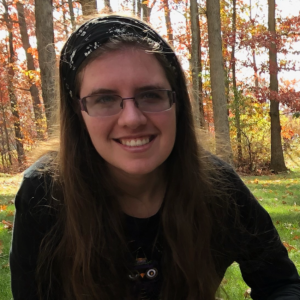
Katherine Trice, I am from Corning, New York, and I am a 4th year PhD student from Corning, New York. Katherine the Language Acquisition and Brain Laboratory (QLAB) under Dr. Zhenghan Qi, where she studies the neural and cognitive underpinnings of language learning, with a particular interest in atypical populations such as autistic or Deaf individuals. Katherine loves reading, writing, and learning new craft skills, and hope to someday be a professor at a university and run her own research lab!
Three Seas at 40: How Northeastern’s immersive marine biology program transforms students into scientists
Northeastern professor and coral reef expert Steve Vollmer was working as a lifeguard in California when he first learned about the Three Seas program that would change his career trajectory — and his life.
At the time, Vollmer — a surfer with a biology degree from Colorado — was talking with a coworker who was counting wave sets at Huntington Beach. He shared that he was applying to graduate schools in Hawaii and California, hoping to pursue marine biology.
There was just one challenge: despite his love for the ocean, Vollmer had no experience studying it.
“She said, ‘Steve, you need some experience. Go to East West,’” which is what the Three Seas program was called back then, Vollmer says.
Accepted into the program, he traveled the world and met scientists who inspired him to go on to get a Ph.D. in marine biology.
“It was awesome,” says Vollmer, an associate professor at Northeastern’s Marine Science Center who teaches a Three Seas course on coral reefs. “The program did exactly what I needed it to do.”
Read more from Northeastern Global News.
Photo by Matthew Modoono/Northeastern University
Spotted in the Windy City: huskies swept away by groundbreaking research.
This April, a group of Northeastern University undergraduate students traveled to Chicago to participate in the American Society for Biochemistry and Molecular Biology’s annual meeting. Representing one of the largest groups Northeastern has ever sent, undergraduates Bita Adel-Zadeh, Ava Kominski, Migue Van Louis Darcera, Hiroki Yamaguchi, Jillian Zerkowski, Priya Thuran, Rupsa Jana, and Mark Teh proudly presented their research led by Professor Kirsten Fertuck, Biochemistry Program Director and ASBMB Chapter faculty advisor.
The event opened with the Undergraduate Poster Competition on Saturday, April 12, where hundreds of undergraduate and even high school posters were presented. Among the participants, fifth-year cell and molecular biology major Migue Van Louis Darcera received an Honorable Mention for his research on pulcherriminic acid as a regulatory signal in bacteria biofilms, conducted in Professor Yunrong Chai’s lab.

The undergraduate presenters gained valuable experience sharing their research with fellow students and received constructive feedback from judges. Adel-Zadeh presented her work on the characterization of tau species in plasma as a detection method for Alzheimer’s disease. Jana introduced her development of engineered STING-ICG lipid nanoparticles for trackable delivery in BRCA-deficient breast cancer treatment. Kominski explored the function of a plausible DNA polymerase protein, Pol A2. Teh discussed the role of plant UDP-glycosyltransferase in cardiotonic steroid biosynthesis. Thuran presented on structurally characterizing Noonan Syndrome-associated NRasT50I mutation. Yamaguchi examined the pathway through which Lon protease regulates the cell envelope in Acinetobacter baumannii, and Zerkowski investigated the coloration mechanism of Mercenaria mercenaria.
Outside of their research presentations, students explored a wide range of sessions tailored to their individual interests. Topics spanned from biochemistry’s role in addressing climate change to advances in protein design for drug discovery, offering endless opportunities for learning and inspiration. A standout moment was a keynote talk on scientific perseverance, delivered through a memorable poker analogy that captured the challenges and realities of today’s research environment. Additionally, a women’s networking dinner featured a candid discussion on the complexities of pursuing a career in research as a woman, providing attendees with valuable mentorship and advice.
Students also expanded their professional networks throughout the conference, forging new connections with researchers from other institutions. Thuran had the opportunity to meet Kendra Marcus, a past graduate student of the Mattos lab and current faculty member at Amherst College, for a coffee chat, leading to a valuable conversation in navigating early scientific careers. The group also had an opportunity to get to know one another better over a dinner organized by Professor Fertuck.
For those who missed this year’s excitement, ASBMB annual meeting will return from March 7–10, 2026, in Washington, D.C. Students interested in presenting should stay connected with the Biochemistry Club ([email protected]) for updates on application deadlines and details.
We look forward to seeing another strong Northeastern presence in ASBMB in 2026!

